英语必修三第三单元语法
英语必修三unit3知识点总结

英语必修三unit3知识点总结.doc英语必修三Unit 3知识点总结前言Unit 3作为英语必修三的重要组成部分,涵盖了丰富的语言知识点和文化背景知识。
本总结旨在帮助学生更好地理解和掌握本单元的核心内容。
第一部分:词汇学习1. 核心词汇Adjectives: beautiful, magnificent, unique, mysterious, ancient, traditional, cultural, historicalNouns: civilization, architecture, sculpture, painting, music, literature, philosophy, religionVerbs: admire, explore, create, preserve, appreciate, influence, develop, transform2. 短语搭配Explore the world: 探索世界Appreciate art: 欣赏艺术Influence culture: 影响文化Preserve history: 保护历史Develop skills: 发展技能第二部分:语法重点1. 被动语态被动语态的构成:be + past participle被动语态的使用:当动作的执行者不明确或不重要时2. 定语从句定语从句的引导词:who, whom, whose, which, that定语从句的作用:修饰先行词,提供更多信息3. 现在完成时现在完成时的形式:have/has + past participle现在完成时的用法:表示过去发生的动作对现在造成的影响或结果第三部分:阅读理解1. 文章结构标题:概括文章主题引言:介绍背景信息正文:详细阐述主题结尾:总结全文,提出观点或建议2. 阅读技巧快速阅读:获取文章大意精读:理解细节,分析作者意图推理判断:根据上下文推断词义或作者观点第四部分:写作技巧1. 写作结构引言:提出话题,吸引读者兴趣正文:分段落阐述观点,提供论据结尾:总结全文,提出个人看法或建议2. 写作技巧使用多样的句型和词汇注意段落之间的逻辑关系确保语法正确,拼写无误第五部分:文化背景知识1. 世界文化遗产介绍几个著名的世界文化遗产,如中国的长城,埃及的金字塔等探讨文化遗产对现代社会的影响2. 艺术与文化讨论不同艺术形式如何反映和塑造文化分析艺术与文化之间的关系第六部分:综合运用1. 口语表达练习描述文化遗产和艺术作品讨论文化遗产保护的重要性2. 听力理解听有关文化遗产和艺术的讲座或访谈练习捕捉关键信息,理解主旨大意结语Unit 3的学习不仅要求学生掌握语言知识,更要求学生能够理解和欣赏文化多样性。
高中英语必修三第三单元知识点总结

高中英语必修三第三单元知识点总结《高中英语必修三》第三单元主要涉及以下几个方面的知识点:人教版必修3Unit3 Sharks第一部分知识梳理。
第一节词汇梳理1.scope范围2.urge敦促3.tame驯服4.inferior低等的5.equip装备6.presumably大概7.instinct本能8.adventure冒险第二节短语梳理1.in search of寻找2.get(to)work开始工作3.be equipped with带有4.be inferior to比……差5.feed on以……为食6.look into调查7.result from起因于8.bear in mind牢记第三节语法梳理一、情态动词'would'与过去的情态相比,语义上表推测与提议。
1.表示过去习惯、倾向'most of the shark victims would have been men'2.表示推测,猜测‘the shark may have made a mistake', 'It would be Mr Hansen'3.表示礼貌、委婉的请求,宣布、征求,提议、归因'do you think he would have killed a dog?'二、句式推测的过去式'could/couldn't'做推测用法。
1.结构:主语+谓语+宾语+情态动词+have done2.推测过去是否发生:肯定推测为could/must have done否定推测:以couldn't/can't/mustn't/may not have done,译为‘(发生过)一定没做过/可能没做过/一定不可能做事’。
即:’He may not have survived'(他可能没有活下来); ‘He must have survived'(他一定活下来了)第四节重要内容梳理关于本单元的阅读材料本单元主要围绕大白鲨展开,涉及鲨鱼与人类的关系、鲨鱼袭击人类的原因、鲨鱼相关的科学研究等。
必修三Unit3语法名词性从句
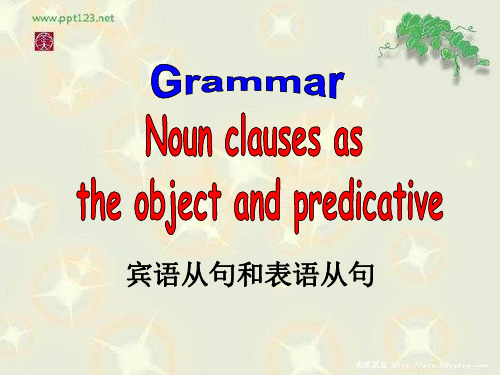
一.that引导的宾语从句 1. Oliver believes (that) a man could survive a month in London. 2. I’m afraid (that) I don’t quite follow you,sir. 3. I don’t think (that) its very funny. 4. My uncle said that he would come and that he would also bring his son. 5.We all agree (that) it would be convient to go there by bus.
We’re sure (that) our team will win .
I’m afraid (that) he won’t pass the
exam .
自我检测
1.She asked Tom_____was the matter with his car. what 2.Will you tell me _____ how I can keep healthy?
1.I wonder if you’d mind us asking a few questions.
1. Henry Adams does not know what he should do. (what在从句中作宾语) 2.Do you know who will be sent to work there? (who在从句中作主语) 3.Can you find out whose wallet it is? (whose在从句中作定语) 4.Have you decided where you should have your holidays? (where在从句中作地点状语) 5.She always think of how she can do more for the class. (how在从句中作方式状语) 6.Can I speak whoever is here?(作主语) 7.Henry didn’t give us any reason about why she had been late for the meeting.(作原因状语)
外研版高中英语必修三module3语法

5. He said, “Mother, the boy is very naughty.”
→He _____ very naughty. A. said his mother that the boy was B. said to his mother that the boy is C. told his mother that the boy was D. spoke to his mother that the boy
“Don’t be late again.”
→The teacher told the student not to be late again.
2. “Wake him up,” she said to me.
→ She told me to wake him up.
21
5. 过去时如有表示具体年份的状语,不 必改变时态。
2. “Have you seen the film?” he asked me.
→He asked me _______. A. had I seen the film B. have I seen the film C. if I have seen the film D. whether I had seen the film
→She asked whether we came from the same city.
19
3. 引语为特殊疑问句时,可以保留疑 问词,后跟陈述句。
1. He asked me, “Where are you going?”
→He asked me where I was going.
2. She asked him, “Whom do you want to see?”
人教版(新教材)必修第三册unit3重点句子总结和语法讲解

UNIT 3 DIVERSE CULTURES本单元重点句子1.I really like that paper folding book,and my son likes that paper folding book,too.我真的很喜欢那本折纸书,我儿子也喜欢那本折纸书。
2.Find out which words have been left out.找出省略了哪些词。
3.it is even mentioned in the oldest collection of Chinese poetry.……甚至在中国最古老的诗集中也提到了它。
4.Historically,Chinese immigrants settled in the area during the railroad construction and gold rush period.历史上,中国移民在铁路建设和淘金热时期定居在该地区。
5.There is Chinese food to suit everyone’s taste,with traditional dishes from all over China.有适合每个人口味的中餐,有来自中国各地的传统菜肴。
6.Does the city/town introduction contain all the important information?城市的介绍包括所有重要的信息吗?7.I have to admit that it definitely feels good to be back in the city again.我不得不承认,再次回到城市的感觉很好。
8..a city that was able to rebuild itself after the earthquake that occurred in 1906.……一个在1906年地震后能够重建自己的城市。
(完整版)英语必修三unit3知识点总结.doc
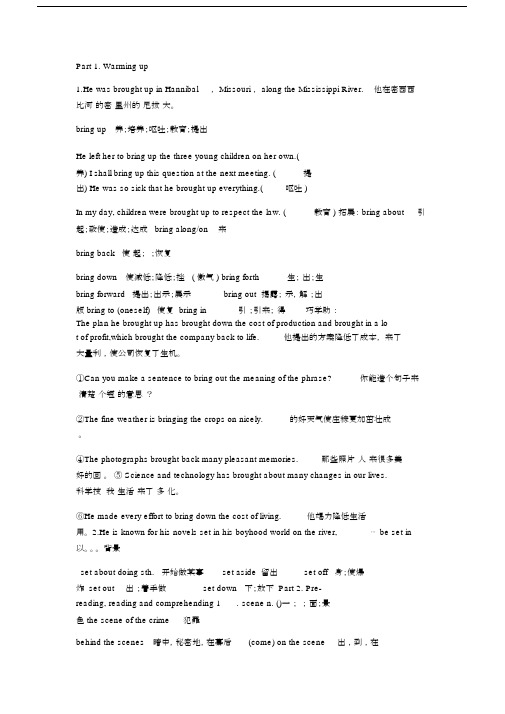
Part 1. Warming up1.He was brought up in Hannibal,Missouri,along the Mississippi River.他在密西西比河的密里州的尼拔大。
bring up养;培养;呕吐;教育;提出He left her to bring up the three young children on her own.(养) I shall bring up this question at the next meeting. ( 提出) He was so sick that he brought up everything.( 呕吐 )In my day, children were brought up to respect the law. ( 教育 ) 拓展: bring about 引起;致使;造成;达成 bring along/on 来bring back 使起;;恢复bring down 使减低;降低;挫 ( 傲气 ) bring forth 生;出;生bring forward 提出;出示;展示bring out 揭露;示,解;出版 bring to (oneself) 使复 bring in 引;引来;得巧学助:The plan he brought up has brought down the cost of production and brought in a lot of profit,which brought the company back to life. 他提出的方案降低了成本,来了大量利,使公司恢复了生机。
①Can you make a sentence to bring out the meaning of the phrase? 你能造个句子来清楚个短的意思?②The fine weather is bringing the crops on nicely. 的好天气使庄稼更加茁壮成。
人教版(2019)高中英语必修第三册unit 3重点句子总结和语法讲解
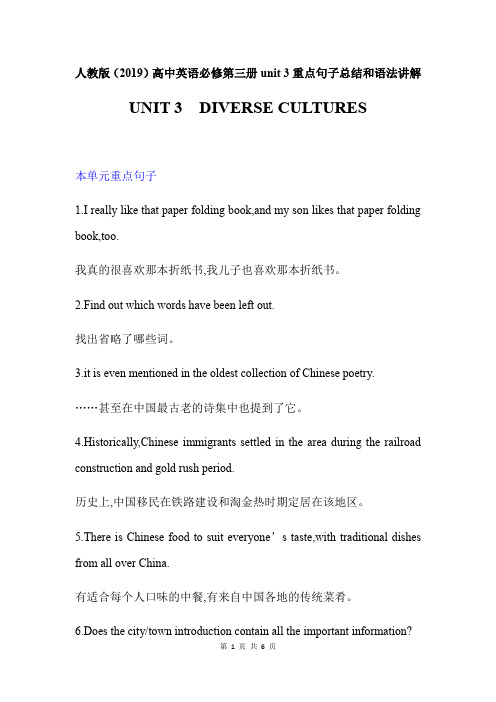
人教版(2019)高中英语必修第三册unit 3重点句子总结和语法讲解UNIT 3 DIVERSE CULTURES本单元重点句子1.I really like that paper folding book,and my son likes that paper folding book,too.我真的很喜欢那本折纸书,我儿子也喜欢那本折纸书。
2.Find out which words have been left out.找出省略了哪些词。
3.it is even mentioned in the oldest collection of Chinese poetry.……甚至在中国最古老的诗集中也提到了它。
4.Historically,Chinese immigrants settled in the area during the railroad construction and gold rush period.历史上,中国移民在铁路建设和淘金热时期定居在该地区。
5.There is Chinese food to suit everyone’s taste,with traditional dishes from all over China.有适合每个人口味的中餐,有来自中国各地的传统菜肴。
6.Does the city/town introduction contain all the important information?城市的介绍包括所有重要的信息吗?7.I have to admit that it definitely feels good to be back in the city again.我不得不承认,再次回到城市的感觉很好。
8..a city that was able to rebuild itself after the earthquake that occurred in 1906.……一个在1906年地震后能够重建自己的城市。
人教版高中英语必修三教学课件:Book3第3单元语法

4.Alongwiththeletterwashispromise____h etwhaotuldvisitmethiscomingChristmas.(04) 5.Theshopkeeperdidnotwanttosellfor____ hethoughtwasnotenough.(05) w6.hIhaat vealwaysbeenhonestandstraightforw ard,anditdoesn’tmatter________I’mtalki ngto.(04) whoever
7.Parentsaretaughttounderstand____hiomwp ortanteducationistotheirchildren’sfuture. (04) 8.ThesewildflowersaresospecialIwoulddo ________Iwcahnattoesvaevrethem.(00) 9.Ireadaboutitinsomebookorother,doesis matter_______itwas?(01)
8.那是因为他没有理解我。 That’sbecausehedidn’tunderstandme. 9.我的建议是我们明天一早就出发。 Mysuggestionisthatwe(should)startearlyto morrowmorning. 10.谁知道将来会发生什么? Whoknowswhatwillhappeninthe future?
(2)由what,whether(if)引导的宾语从 句,例如:
高中英语必修三第三单元知识点总结

高中英语必修三第三单元知识点总结在高中英语必修三的第三单元中,我们主要学习了关于描述人和事情的形容词和副词,以及相关的语法和用法。
下面将对这些知识点进行总结和归纳。
形容词和副词的比较级和最高级比较级用于两个人或物之间的比较,最高级用于三个或三个以上的人或物之间的比较。
•形容词的比较级和最高级规则:–单音节词:比较级在词尾加-er,最高级在词尾加-est。
如:tall(高)-taller(更高)- tallest(最高)。
–部分双音节词:在词尾加-er,-est。
如:clever(聪明)- cleverer(更聪明)- cleverest(最聪明)。
–多音节词和部分双音节词及部分以-y结尾的词:在前面加more或most。
如:beautiful(美丽)- more beautiful(更美丽)- most beautiful(最美丽)。
•副词的比较级和最高级规则:–单音节词:比较级和最高级在词尾加-er,-est。
如:fast(快速地)- faster (更快地)- fastest(最快地)。
–以-y结尾的词:变-y为-i,再加-er,-est。
如:heavy(重)- heavier(更重)- heaviest(最重)。
–多音节词和部分以-ly结尾的副词:在前面加more或most。
如:carefully (小心地)- more carefully(更小心地)- most carefully(最小心地)。
形容词和副词的用法和注意事项•形容词用法:–修饰名词,用于句子的主语、宾语、定语等。
如:a beautiful garden(一个美丽的花园)、He is tall(他很高)。
–作表语,连接系动词和名词。
如:She is clever(她很聪明)。
•副词用法:–修饰动词,表示动作的方式、程度或频率。
如:She runs fast.(她跑得快)。
–修饰形容词或副词,表示程度或程度的变化。
如:He is very tall.(他很高)。
高中英语新人教版必修三Unit 3- 4语法汇总
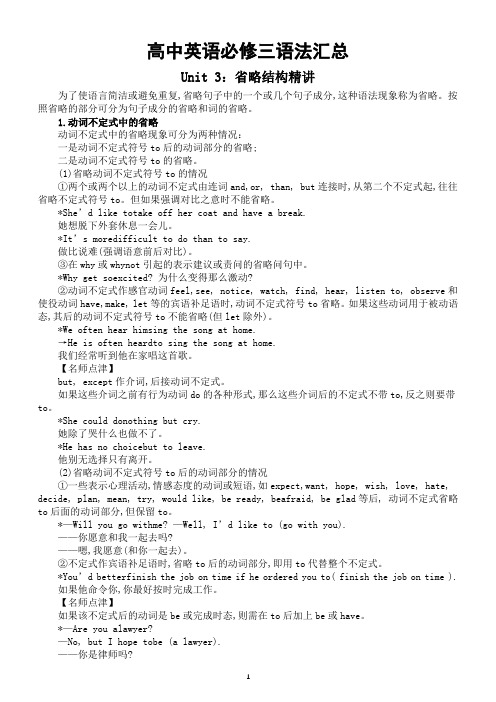
高中英语必修三语法汇总Unit 3:省略结构精讲为了使语言简洁或避免重复,省略句子中的一个或几个句子成分,这种语法现象称为省略。
按照省略的部分可分为句子成分的省略和词的省略。
1.动词不定式中的省略动词不定式中的省略现象可分为两种情况:一是动词不定式符号to后的动词部分的省略;二是动词不定式符号to的省略。
(1)省略动词不定式符号to的情况①两个或两个以上的动词不定式由连词and,or, than, but连接时,从第二个不定式起,往往省略不定式符号to。
但如果强调对比之意时不能省略。
*Sh e’d like totake off her coat and have a break.她想脱下外套休息一会儿。
*It’s moredifficult to do than to say.做比说难(强调语意前后对比)。
③在why或whynot引起的表示建议或责问的省略问句中。
*Why get soexcited? 为什么变得那么激动?②动词不定式作感官动词feel,see, notice, watch, find, hear, listen to, observe和使役动词have,make, let等的宾语补足语时,动词不定式符号to省略。
如果这些动词用于被动语态,其后的动词不定式符号to不能省略(但let除外)。
*We often hear himsing the song at home.→He is often heardto sing the song at home.我们经常听到他在家唱这首歌。
【名师点津】but, except作介词,后接动词不定式。
如果这些介词之前有行为动词do的各种形式,那么这些介词后的不定式不带to,反之则要带to。
*She could donothing but cry.她除了哭什么也做不了。
*He has no choicebut to leave.他别无选择只有离开。
高一必修三英语unit3知识点
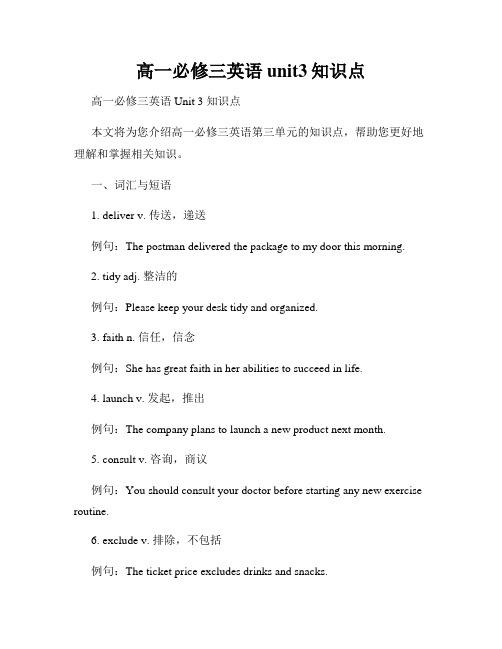
高一必修三英语unit3知识点高一必修三英语Unit 3 知识点本文将为您介绍高一必修三英语第三单元的知识点,帮助您更好地理解和掌握相关知识。
一、词汇与短语1. deliver v. 传送,递送例句:The postman delivered the package to my door this morning.2. tidy adj. 整洁的例句:Please keep your desk tidy and organized.3. faith n. 信任,信念例句:She has great faith in her abilities to succeed in life.4. launch v. 发起,推出例句:The company plans to launch a new product next month.5. consult v. 咨询,商议例句:You should consult your doctor before starting any new exercise routine.6. exclude v. 排除,不包括例句:The ticket price excludes drinks and snacks.7. accompany v. 陪同,伴随例句:I'll accompany you to the airport so that you won't get lost.8. focus n. 焦点,重点例句:The meeting's focus will be on the company's future expansion plans.9. transfer v. 转移,调动例句:He was transferred to the company's branch office in New York.10. obtain v. 获得,得到例句:You can obtain a copy of the report from the receptionist.二、语法知识1. 动词的时态和语态英语动词有多种时态和语态,如一般现在时、一般过去时、现在进行时、过去进行时、一般将来时、被动语态等。
高二英语必修三unit3单元知识点:语法

高二英语必修三 unit3 单元知识点:语法 (一)一般现在时 1.肯定句:WespeakChinese 否定句:Wedon'tspeakChinese. 一般疑问句:DoyouspeakChinese? 回答:Yes,wedo.No,wedon't. 2.肯定句:MikespeaksEnglish. 否定句:Mikedoesn'tspeakEnglish. 一般疑问句:Doeedoes.No,hedoesn't. 3.动词第三人称单数构成形式:见书本 107 页 (二)代词 人称代词: 数/格 人称单数复数 主格宾格主格宾格
精心整理 第一人称 Imeweus 第二人称 youyouyouyou 第三人称 hehim they them sheher itit 主格:在句中当句子主语 e.g.Ihaveagoodfriend. Hehasagoodfriend. 宾格:在句中当动词的宾语或介词的宾语,形成动宾或介宾结构. PleasecallmeMike.(动宾) Giveit(动宾)tome(介宾). Helpusfindhim.(动宾) 人称代词排列顺序:(可记住口诀) you,heandI;we,youandthey;heandshe 口诀:对你尊重 you 在前,谦虚礼貌 I 最后;
精心整理 第三人称 theirtheirs 形容词性物主代词,也称非独立性物主代词,不能单独使用,必须与 名词共同使用. e.g.myname yourmother hisfriend theirteacher
精心整理 我们人多力量大,we 要排在 you 之前,they 委屈垫在后; 两性并列不平等,绅士风度放一边,he 在前 she 在后。 特殊情况: 1.为了强调某人称,或是出现在承认错误之类的句中时,应把第一人 称的 I,放在前。 2.当说话人 I 的身份很高或回忆往事时,可以先说 I。 物主代词: 性 数/人称 形容词性物主代词 名词性物主代词 单数第一人称 mymine 第二人称 youryours 第三人称 hishis herhers itsits 复数第一人称 ourours 第二人称 youryours
人教版高中英语必修三第3单元重点句型及精讲
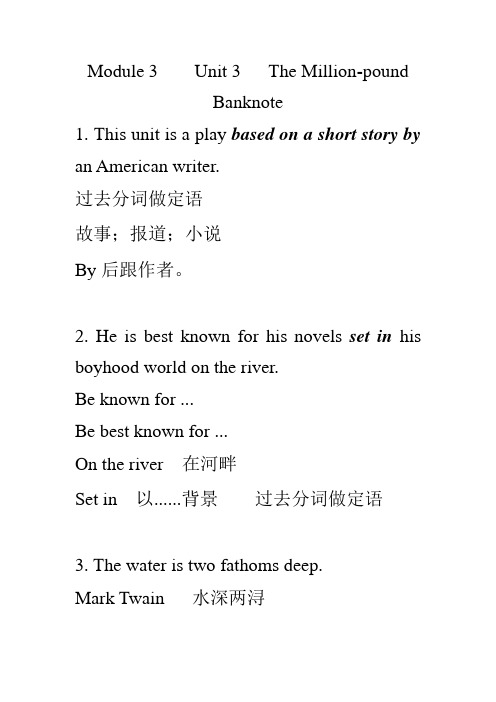
Module 3 Unit 3 The Million-poundBanknote1. This unit is a play based on a short story by an American writer.过去分词做定语故事;报道;小说By后跟作者。
2. He is best known for his novels set in his boyhood world on the river.Be known for ...Be best known for ...On the river 在河畔Set in 以......背景过去分词做定语3. The water is two fathoms deep.Mark Twain 水深两浔TwinTwins4. Narrator: ... It is Henry Adams, an American businessman, who is lost in London.5. How well do you know London?How many6. I wonder if yo u’d mind us asking a few questions.Mind sb doingMind I/ me/ my/ Jim/ Jim’s asking7. The fact is that I earned my passage by working as an unpaid hand, which accounts for my appearance.That引导表语从句Unpaid hand 义工We are a hand short. 我们少个人手。
Account for 是......的原因8. I’m afraid I don’t quite follow you.明白Follower 门徒9. Now if you’ll excuse me, I think I will be on my way.Excuse me 打扰一下;失陪;借过10. I don’t want your charity. I just want an honest job.Charity store 慈善商店Decent11. First find what Henry says or does on the following occasions...On the occasionOn these occasions 每当此时On one occasion 有一次On another occasion 又一次On many occasions 总是Occasion vt. 导致OpportunityOpportune 适当的;合适的12. The professor wandered from the subject of his speech.跑题13. I opened an account at the bankdownstairs.开户Savings account 活期账户Deposit account 定期Draw money from the bank 取钱14. Underline all the examples in the play where noun clauses are used as the object. Mark a star beside each of them.Where引导定语,表示抽象的所在。
人教课标版高中英语必修3Unit3_单元语法详解

Unit3 单元语法详解宾语从句和表语从句宾语从句宾语从句在复合句中起宾语的作用,可以放在动词、介词及少数形容词之后。
宾语从句应用陈述句语序。
l. that引导的宾语从句(1)that引导宾语从句时本身无词义,在从句中也不充当句子成分,在非正式文体中that可以省略。
I think( that) you are right. 我认为你是对的。
(2)由并列连词and和but所连接的两个或两个以上的由that引导的宾语从句,第一个从句的that可以省略,第二个及其后的从句中的that不可省略。
He said ( that) he had eaten nothing but that he was not hungry.他说他没有吃东西,但不饿。
(3)在含有复合宾语的句子中,that引导的宾语从句必须后置,用it作形式宾语。
可这样使用的动词有think, find, feel, consider, make等。
We think it possible that you can finish the job today.我们认为你今天可能完成这项工作。
(4)that引导的从句一般不能作介词的宾语(but, except, in除外),有时可借助it来表示。
I know nothing about him except that he is a writer.除了知道他是个作家,别的我一无所知。
We depend on it that you help us with the work.我们要靠你们来帮助我们完成工作。
例1 The teacher informed us we would have a test the next day.解析:考查宾语从句。
句意:老师告知我们第二天进行测试。
从句部分不缺少句子成分,句意完整,所以填that即可。
答案that2. whether/if引导的宾语从句(1) whether和if表示“是否”,在宾语从句中不充当句子成分。
必修3第三单元语法.ppt
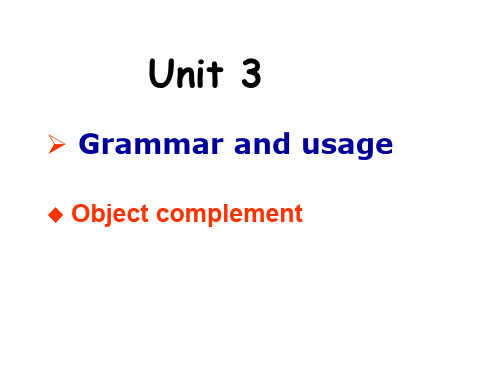
Exercise two: Multiple choice:
1. About eighty percent of the students in his class ___B___ below sixteen. A. is B. are C. am D. be
3. You’d better leave the window _o_p_e_n_ during the day. (开 着)
4.We consider him __(_t_o_b_e_)_a_n__h_o_n_e_s_t _b_o_y__ (是位诚实的 孩子).
5.They all call the machine _a__r_o_b_o_t(机器人).
2. To-infinitive or bare infinitive? • 使役动词let/ make/ have sb. do sth
但是 get sb. to do • 感官动词 see/hear/notice/feel/observe
look at/listen to/ watch sb. do sth
--- What do people think about dogs? --- People believe that dogs are honest.
( People believe dogs (to be) honest. )
V. + Object + object complement
eg: …found the door open …found nobody in the classroom …consider her performance a big success …believe dogs to be honest
必修三 第三单元 知识必备
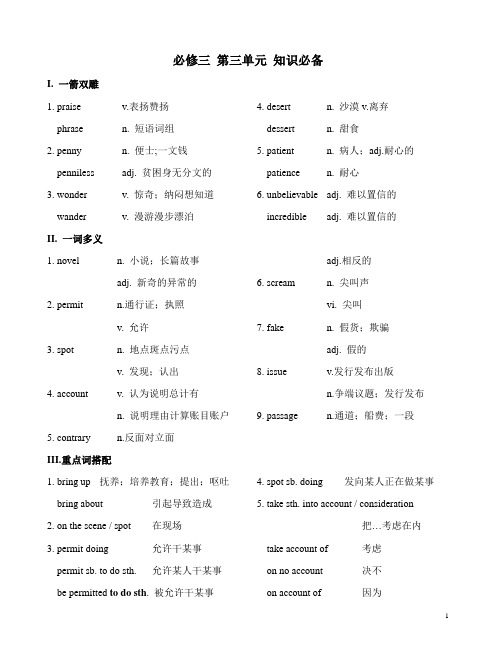
必修三第三单元知识必备I. 一箭双雕1. praise v.表扬赞扬phrase n. 短语词组2. penny n. 便士;一文钱penniless adj. 贫困身无分文的3. wonder v. 惊奇;纳闷想知道wander v. 漫游漫步漂泊4. desert n. 沙漠v.离弃dessert n. 甜食5. patient n. 病人;adj.耐心的patience n. 耐心6. unbelievable adj. 难以置信的incredible adj. 难以置信的II. 一词多义1. novel n. 小说;长篇故事adj. 新奇的异常的2. permit n.通行证;执照v. 允许3. spot n. 地点斑点污点v. 发现;认出4. account v. 认为说明总计有n. 说明理由计算账目账户5. contrary n.反面对立面adj.相反的6. scream n. 尖叫声vi. 尖叫7. fake n. 假货;欺骗adj. 假的8. issue v.发行发布出版n.争端议题;发行发布9. passage n.通道;船费;一段III.重点词搭配1. bring up 抚养;培养教育;提出;呕吐bring about 引起导致造成2. on the scene / spot 在现场3. permit doing 允许干某事permit sb. to do sth. 允许某人干某事be permitted to do sth. 被允许干某事4. spot sb. doing 发向某人正在做某事5. take sth. into account / consideration把…考虑在内take account of 考虑on no account 决不on account of 因为open an account 开账户6. seek for / after 寻找;追求seek help 求助seek a job 找工作7. a large amount of 不可数、谓单large amounts of 不可数、谓复a great deal of 不可数a large sum of8. a great many + 可数复数a large number of9. many a 可单、谓单more than one 可单、谓单10. amount to 合计达;共计达11. as for / as towith regard to 关于;至于12. take a bow 鞠躬答谢;谢幕bow to sb. 向某人鞠躬13. at the barber’s 在理发店IV. 课文重点短语1. a play based on a short story以真实故事为基础的戏剧2. be known for 以…闻名3. be set in 以…为背景4. step inside 迈步进来5. as a matter of fact 事实上6. I don’t follow you. 我不懂您的意思。
- 1、下载文档前请自行甄别文档内容的完整性,平台不提供额外的编辑、内容补充、找答案等附加服务。
- 2、"仅部分预览"的文档,不可在线预览部分如存在完整性等问题,可反馈申请退款(可完整预览的文档不适用该条件!)。
- 3、如文档侵犯您的权益,请联系客服反馈,我们会尽快为您处理(人工客服工作时间:9:00-18:30)。
Just have a go. Can you choose the best answer to each sentence from 06 NMET? 1. With his work completed, the businessman stepped B back to his seat, feeling pleased _____ he was a man of action. ( 2006 湖南 ) A. which B. that C. what D. whether 2. We haven't settled the question of _______it is C necessary for him to study abroad. ( 2006江苏 ) A. if B. where C. whether D. that A 3._______makes this shop different is that it offers more personal services.(2006辽宁 ) A. What B. Who C. Whatever D. Whoever
B. you might not D. you mustn’t
15. We didn’t see Tom at the meeting yesterday.
He B
it.
A. mustn’t have attended B. cannot have attended C. needn’t have attended D. would have not attended
19. — Mum, I climbed to the top of the shelf and got the Teddy Bear. — My goodness! You may have hurt D yourself. You _____ do that again. A. don’t have to B. may not C. needn’t D. mustn’t 20. Everybody is working hard. There A ________ be trouble in finishing the work on time. A. ought not to B. needn’t C. mustn’t D. ought to not
11. ---There were already five people in the car,
but they managed to take me as well.
---It ____a comfortable journey D A. can’t be B. shouldn’t be C. mustn’t have been D. couldn’t have been C 12. It’s nearly seven o’clock . Jack ___be here at any moment. A. must B. need C. should D. could
that / what
1.______ he wants is a book. What 2. ______ he wants to go there is obvious. That 3.The result is ______ we won the game. that 4.This is _____ we want to know. what 5.Is what he told us true ? _____ 6.We should pay attention to ______ the teacher is saying. what 7. I have no doubt _____ he will come. 8. I have no idea _____that that afternoon. he did
B 8. I thought you _____like something to read, so
I have brought you some books. C. would D 9. Where is my pen? I ____it. A. might lose A. may B. might D. must
what
不能使用if 的情况:
a. 主语从句 b. 表语从句 c. 同位语从句 e. 介词后的宾语从句 f. whether to do 做动词宾语不能用if to do. g whether or not 连在一起引导宾语从句时 不用if.
1. You ____ your tooth pulled out before it rot D completely. A. had better got B. had to get better C. had better to get D. had better get 2. When we got to the cinema, the film hasn’t started yet, so we ____. D A. needn’t hurry B. didn’t need hurry C. needn’t to hurry D. needn’t have hurried 3. It was really very dangerous; you ____ him A seriously. A. might have injured B. could injure C. should have injured D. must injure
13. ---Did the train arrive in time? B ---No. It _______ two hours ago. A. must have arrived B. ought to have arrived C. must arrive D. ought to arrive 14. ---Must I drive to his house and pick up the children? ---No, C . A. you shouldn’t C. you needn’t
1.______ the baby could speak made his parents very happy. 主语从句 A. That B. What C. Why D. If 2. I wonder ____ you will go shopping or stay at home.
A. that B. if C. whether D. what 宾语从句
4. As he had heart attack, he was told that he ____ continue the work. C A. needn’t B. may not C. mustn’t D. can't A 5. We ought to help each other in our work, ____? A. oughtn’t we B. should we C. shouldn't we D. ought to we 6. Two eyes ____see more than one. A A. can B. may C. will D. should 7. When I got to the cinema, the film had already started; I____ there earlier. B A. ought to get B. ought to have got C. must have got D. must get
4. See the flags on top of the building? That D was______we did this morning. ( 2006全国I ) A. when B. which C. where D. what B 5. Please remind me_______he said he was going. I may be in time to see him off. ( 2006全国I ) A. where B. when C. how D. what 6. --- What did your parents think about your D decision? --- They always let me do _______ I think I should. ( 2006全国III ) C A. when B. that C. how D. what 7. One advantage of playing the guitar is _________ it can give you a great deal of pleasure.(2006上海 )
3. This is _____ he was often late for school. 表语从句 4. We all know the truth ____ the earth ____ around the sun. 同位语从句 A. if; moved B. that; moves C. why; move D. whether; move
(2) 疑问词引导的名词性从句要求使用陈述句 语序,不能用一般疑问句语序。
他是怎么成功的仍然是个谜。
How was he successful is still a puzzle. ( How he was successful is still a puzzle. ( ) )
F T
你能告诉我他住在什么地方吗?
16. There is someone knocking at the door. A it be Tom? A. Can
B. Must
C. Should
D. Ought to
17. You ________ take me to the station, A and my brother is taking me. A. don’t have to B. mustn’t C. can’t D. shouldn’t 18. — Must I hand in the homework now? B — ___________. You can hand it in tomorrow morning. A. Yes, you must B. No, you needn’t C. Yes, you need D. No, you mustn’t
